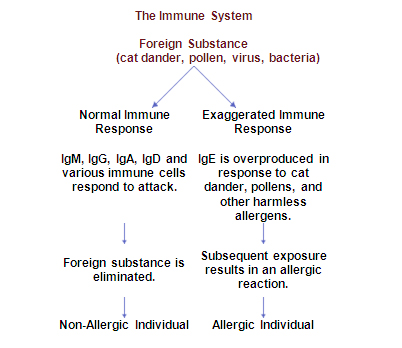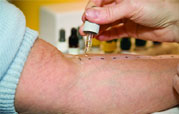


What is Allergy
Allergy is a disorder of the immune system often also referred to as atopy. Allergic reactions occur to normally harmless environmental substances known as allergens; these reactions are acquired, predictable, and rapid. Strictly, allergy is one of four forms of hypersensitivity and is called type I (or immediate) hypersensitivity. It is characterized by excessive activation of certain white blood cells called mast cells and basophils by a type of antibody known as IgE, resulting in an extreme inflammatory response. Common allergic reactions include eczema, hives, Hay fever, Asthma, food allergies, and reactions to the venom of stinging insects such as wasps and bees.
Mild allergies like Hay fever are highly prevalent in the human population and cause symptoms such as allergic conjunctivitis, itchiness, and runny nose. Allergies can play a major role in conditions such as Asthma. In some people, severe allergies to environmental or dietary allergens or to medication may result in life-threatening anaphylactic reactions and potentially death.
A variety of tests now exist to diagnose allergic conditions; these include testing the skin for responses to known allergens or analyzing the blood for the presence and levels of allergen-specific IgE. The orthodox treatments for allergies include allergen avoidance, use of anti-histamines, steroids or other oral medications, immunotherapy to desensitize the response to allergen, and targeted therapy. The medical specialty concerned with allergies is allergology.
Mild allergies like Hay fever are highly prevalent in the human population and cause symptoms such as allergic conjunctivitis, itchiness, and runny nose. Allergies can play a major role in conditions such as Asthma. In some people, severe allergies to environmental or dietary allergens or to medication may result in life-threatening anaphylactic reactions and potentially death.
A variety of tests now exist to diagnose allergic conditions; these include testing the skin for responses to known allergens or analyzing the blood for the presence and levels of allergen-specific IgE. The orthodox treatments for allergies include allergen avoidance, use of anti-histamines, steroids or other oral medications, immunotherapy to desensitize the response to allergen, and targeted therapy. The medical specialty concerned with allergies is allergology.
What are causes of Allergy
Top
Risk factors for allergy can be placed in two general categories, namely host and environmental factors... Host factors include heredity, sex, race, and age, with heredity being by far the most significant. However, there have been recent increases in the incidence of allergic disorders that cannot be explained by genetic factors alone. Four major environmental candidates are alterations in exposure to infectious diseases during early childhood, environmental pollution, allergen levels, and dietary changes.


Signs and symptoms
Top
Common symptoms of allergy |
|
Affected organ |
Symptom |
Nose |
swelling of the nasal mucosa (allergic rhinitis) |
Sinuses |
allergic sinusitis |
Eyes |
redness and itching of the conjunctiva (allergic conjunctivitis) |
Airways |
Sneezing, coughing, bronchoconstriction, wheezing and dyspnoea, sometimes outright attacks of Asthma, in severe cases the airway constricts due to swelling known as angioedema |
Ears |
Feeling of fullness, possibly pain, and impaired hearing due to the lack of Eustachian tube drainage. |
Skin |
rashes, such as eczema and hives (urticaria) |
Gastrointestinal tract |
abdominal pain, bloating, vomiting, Diarrh |
Many allergens such as dust or pollen are airborne particles. In these cases, symptoms arise in areas in contact with air, such as eyes, nose and lungs. For instance, allergic rhinitis, also known as Hay fever, causes irritation of the nose, sneezing, and itching and redness of the eyes. Inhaled allergens can also lead to Asthmatic symptoms, caused by narrowing of the airways (bronchoconstriction) and increased production of mucus in the lungs, shortness of breath (dyspnea), coughing and wheezing.
Symptoms of food allergy include abdominal pain, bloating, vomiting, diarrhea, itchy skin, and swelling of the skin during hives. Food allergies rarely cause respiratory (Asthmatic) reactions, or rhinitis.
Insect stings, antibiotics, and certain medicines produce a systemic allergic response that is also called anaphylaxis; multiple organ systems can be affected, including the digestive system, the respiratory system, and the circulatory system. Depending of the rate of severity, it can cause cutaneous reactions, bronchoconstriction, edema, hypotension, coma, and even death. This type of reaction can be triggered suddenly, or the onset can be delayed. The nature of anaphylaxis is such that the reaction can seem to be subsiding, but may recur throughout a prolonged period of time.
Substances that come into contact with the skin, such as latex, are also common causes of allergic reactions, known as contact dermatitis or eczema. Skin allergies frequently cause rashes, or swelling and inflammation within the skin, in what is known as a "wheal and flare" reaction characteristic of hives and angioedema.
Types of Allergy
Top
The list of types of Allergies mentioned in various sources includes:
Hay fever
Asthma
Allergic rhinitis
Atopic dermatitis
Allergic sinusitis
Airborne allergies
Celiac sprue
Food allergies
Latex allergies
Food allergies
Drug Allergies
Insect sting allergies
Ragweed allergies
Birch pollen allergies
Mold allergies
Dust mite allergies
Animal allergies
MSG allergy
Sulfite allergy Homoeopathic Approach:
Homoeopathic medicines act by:
Relieving the symptoms:
Preventing exacerbations (attacks)
Controlling and curing the disease process
Relieving Symptoms: Homoeopathic medicines offer considerable relief symptoms of Allergic patients
Preventing exacerbations (attacks):
 Homoeopathic medicines prevent any exacerbations at fist prolonging the time between episodes and later preventing their occurrence leading to permanent cure.
Controlling and curing the disease process: Homoeopathic medicines offer permanent cure in allergic conditions they act by curtailing the individual's immune response against allergens, thus decreasing their hypersentivity towards triggering stimuli. The development of allergic conditions is multifactorial and depends upon interaction between susceptible genes and environmental factors. Thus homoeopathy with its deep acting constitutional remedies offers excellent results.
Homoeopathic medicines prevent any exacerbations at fist prolonging the time between episodes and later preventing their occurrence leading to permanent cure.
Controlling and curing the disease process: Homoeopathic medicines offer permanent cure in allergic conditions they act by curtailing the individual's immune response against allergens, thus decreasing their hypersentivity towards triggering stimuli. The development of allergic conditions is multifactorial and depends upon interaction between susceptible genes and environmental factors. Thus homoeopathy with its deep acting constitutional remedies offers excellent results.
Our medicines have not to be taken for life time. Once cured the patients develops immunity towards the triggering stimulus which is maintained even after medication is stopped.
All types of allergies mentioned above show excellent response to homoeopathic treatment
Hay fever
Asthma
Allergic rhinitis
Atopic dermatitis
Allergic sinusitis
Airborne allergies
Celiac sprue
Food allergies
Latex allergies
Food allergies
Drug Allergies
Insect sting allergies
Ragweed allergies
Birch pollen allergies
Mold allergies
Dust mite allergies
Animal allergies
MSG allergy
Sulfite allergy Homoeopathic Approach:
Homoeopathic medicines act by:
Relieving the symptoms:
Preventing exacerbations (attacks)
Controlling and curing the disease process
Relieving Symptoms: Homoeopathic medicines offer considerable relief symptoms of Allergic patients
Preventing exacerbations (attacks):
 Homoeopathic medicines prevent any exacerbations at fist prolonging the time between episodes and later preventing their occurrence leading to permanent cure.
Controlling and curing the disease process: Homoeopathic medicines offer permanent cure in allergic conditions they act by curtailing the individual's immune response against allergens, thus decreasing their hypersentivity towards triggering stimuli. The development of allergic conditions is multifactorial and depends upon interaction between susceptible genes and environmental factors. Thus homoeopathy with its deep acting constitutional remedies offers excellent results.
Homoeopathic medicines prevent any exacerbations at fist prolonging the time between episodes and later preventing their occurrence leading to permanent cure.
Controlling and curing the disease process: Homoeopathic medicines offer permanent cure in allergic conditions they act by curtailing the individual's immune response against allergens, thus decreasing their hypersentivity towards triggering stimuli. The development of allergic conditions is multifactorial and depends upon interaction between susceptible genes and environmental factors. Thus homoeopathy with its deep acting constitutional remedies offers excellent results.
Our medicines have not to be taken for life time. Once cured the patients develops immunity towards the triggering stimulus which is maintained even after medication is stopped.
All types of allergies mentioned above show excellent response to homoeopathic treatment
Common allergic reactions include eczema, hives, Hay fever, Asthma, food allergies, and reactions to the venom of stinging insects such as wasps and bees.
What is the role of Homoeopathy in allergies?
Top
Homoeopathic medicines act by:
Preventing exacerbations (attacks):
Homoeopathic medicines prevent any exacerbations at fist prolonging the time between episodes and later preventing their occurrence leading to permanent cure.
Controlling and curing the altered immune response:
Homoeopathic medicines offer permanent cure in allergic conditions they act by curtailing the individual's immune response against allergens, thus decreasing their hypersensitivity towards triggering stimuli and curing the altered immunity. The development of allergic conditions is multifactorial and depends upon interaction between susceptible genes and environmental factors. Thus homoeopathy with its deep acting constitutional remedies offers excellent results.
- Relieving the symptoms:
- Preventing exacerbations (attacks)
- Controlling and curing the altered immune response
Preventing exacerbations (attacks):
Homoeopathic medicines prevent any exacerbations at fist prolonging the time between episodes and later preventing their occurrence leading to permanent cure.
Controlling and curing the altered immune response:
Homoeopathic medicines offer permanent cure in allergic conditions they act by curtailing the individual's immune response against allergens, thus decreasing their hypersensitivity towards triggering stimuli and curing the altered immunity. The development of allergic conditions is multifactorial and depends upon interaction between susceptible genes and environmental factors. Thus homoeopathy with its deep acting constitutional remedies offers excellent results.
- Our medicines have not to be taken for lifetime. Once cured the patients develops immunity towards the triggering stimulus, which is maintained even after medication is stopped.
- All types of allergies (skin, food, dust) mentioned above show excellent response to homoeopathic treatment
- We at DRSS provide our patients with diet charts, exercise schedules and guide them how to modify their lifestyle so that better results can be achieved.
- Our medicines can be started with conventional treatment depending upon the disease state and case

Allergy
Related Diseases




